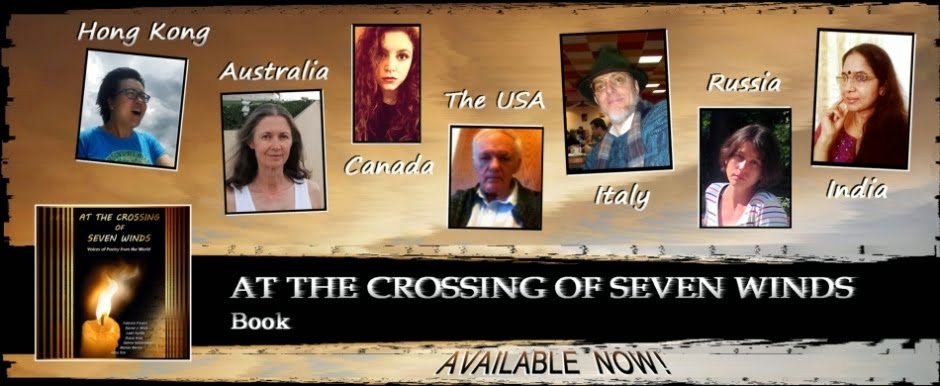From top (left) to bottom right) :
Abby Sze (Hong Kong, HK)
Abby Sze (Hong Kong, HK)
~*~
Mallika
Menon (Trivandrum, India)
~*~
Daniel J.
Brick (Saint Paul, MN, USA)
Leah
Ayliffe (Toronto, Canada)
~*~
~*~
Fabrizio
Frosini (Florence, Italy)
~*~
Diane Hine
(Perth, Australia)
~*~
Galina
Italyanskaya (Saint Petersburg, Russia)
~*~
Introduction
by
Daniel J. Brick
Many years ago, in a poetry class for
beginners, I read one of my early efforts which contained the following three
lines:
" A young poet drops his pen,
astonished
by the twenty lines he has just
written,
certain it is the Poem of Total
Realization."
The teacher, who was supportive of our
weekly efforts, smiled and said, "I
remember thinking I had written that poem when I was sixteen." I can
now agree wholeheartedly with her: the Poem
of Total Realization is an adolescent fantasy. A mature poet recognizes it
as a fool's errand, because, first, no single poem can encompass the variety of
all human experience. Second, the writing of such a poem would end a poet's
career, since all of his future poems would be mysteriously contained in that
magnum opus. It would take all the oxygen into itself, and leave all the living
poets breathless and gasping.
What we learn from writing poems over a
long expanse of time is that each one takes further along the path of our daily
life, leading eventually to whatever fulfills our existence. Each poem
illuminates for its moment the darkness surrounding us, and in that light we
can see the World in its glory or, sadly, in its degradation. Finally, we will
carry within, not only the poem as a piece of literature but also the
emotional growth it promotes.
Our poems express our individual selves.
It is not just self-expression, although that's the surface impression often
conveyed. It's something far more deeply interfused, as Wordsworth memorably put it. We filter our experiences through our
poetic selves to make poems which reveal both the Self and the World. When we
look back at our poems, a day or a decade later, we are often surprised by the
discoveries about life they carry within. Robert
Frost put this very succinctly: a poem, he wrote, begins in delight and
ends in wisdom. But that wisdom is never A Big Statement; it's not an abstract
idea, or a philosophy. It's like a window opened to admit more light. It takes
the form of an insight that points to emotional growth, and propels our lives
toward ever richer states of being.
And so it fulfills the very nature of
poetry that we 7 poets publish our poems in a common anthology and witness how
these diverse poems reflect each other, relate to each other, amplify each
other. Poetry is the most democratic of all the arts, because its essential
material - language - is a given in every person's life. This makes poetry accessible to every person
as a reader and writer.
Walt Whitman
celebrated this democratic core of poetry eloquently:
"The messages of great poems
to each man and woman are, Come to us on
equal terms, only then can you understand us. We are no better than you"
(Daniel J. Brick, Saint Paul, MN, USA)



No comments:
Post a Comment